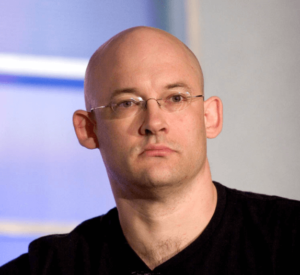Clay Shirky is the Vice Provost for Educational Technologies at New York University. He is an American consultant, writer, and teacher, and his specialty is the social and economic impact of Internet technologies and journalism. His courses have addressed issues such as how networks shape culture and how the topology of social and technological networks is interrelated.

Education and Career
Shirky graduated from Yale University with a bachelor’s degree in fine arts in 1986 and moved to New York. There, he founded the hard Place Theater. This theater produced nonfiction using only nonfiction materials. He moved on to become a Professor of New Media at Hunter College. He helped design their MFA in Integrated Media Arts program.
Shirky joined NYU’s full time faculty in 2004, and from 2014 to 2017, he served as Chief Information Officer at NYU Shanghai. He is an Associate Professor at the Arthur L. Carter Center of Journalism in FAS and an Associate Arts Professor in the Tisch School of the Arts’ Interactive Telecommunications Program.
As Vice Provost for Educational Technologies at NYU, Shirky is responsible for the design, development, and enhancement of the academic aspects of technology based teaching and learning at NYU. He oversees the strategy plan for instructional technology across departments, including the deans, faculty, NYU IT department, and other involved offices.
In addition, he advises the schools on how to use online technology to recruit new students, help existing students with learning and progression, and how to save on costs while generating revenue. Finally, he manages the inventory of NYU’s courses that are offered online. Shirky is the chair of NYU’s Future of Technology-Enhanced Education Committee.
Shirky was named one of Foreign Policy’s “Top 100 Thinkers” in 2010, and he has had regular columns in various publications.
Published Works
Shirky is best recognized as an expert on the social and economic impact of Internet technologies. He has published a number of books, including Little Rice: Smartphones, Xiaomi, and the Chinese Dream in 2015, Cognitive Surplus: Creativity and Generosity in a Connected Age in 2010, and Here Comes Everybody: The Power of Organizing Without Organizations in 2008. His work often focuses on the benefits of collaborative efforts and open sourcing.
Shirky has written articles and been published in The New York Times, The Wall Street Journal, Wired, Foreign Affairs, Computerworld, and Harvard Business Review. He has also had regular columns in FEED, Business 2.0, and others.
Public Speaking
Shirky is known as a passionate and outspoken speaker on the potential impacts of the Internet. He is a proponent of open source technologies and freedom to share, and he has been interviewed and written on it since 1996. He gives talks as a conference and keynote speaker across the globe, and many of his talks can be seen on YouTube.
Some of the topics Shirky covers include Social Networks and Society, Copyright and Freedom of Information, Economics and Social Technologies, the Internet and Democracy, and The Future of Newspapers, Making News Pay.
The Shirky Principle
The Shirky Principle is named for Clay Shirky, and it states that, “Institutions will try to preserve the problem to which they are the solution.” This challenge can be the result of the institution not recognizing a new or different way of doing things or it can be resistance to making changes that would remove the need of the institution.
Examples where the Shirky Principle applies include the traditional newspapers’ resistance to alternate sources online, the fact that there is more money to be earned from life-long illnesses than there is in cures, or resistance to self checkouts at a grocery store.
There is a complacence in an institution knowing they are needed in the future, and disrupting that future need can render the institution unnecessary, which is difficult for some institutions or policies to accept. There are examples of concepts that are not tied up in the Shirky Principle, such as the light bulb industry moving toward manufacturing long-lasting and energy efficient light bulbs or the UK Vitality Health Insurance that rewards individuals who maintain a healthy lifestyle.
